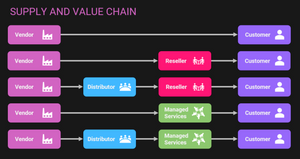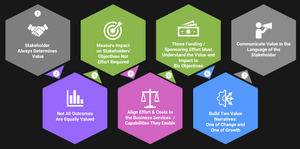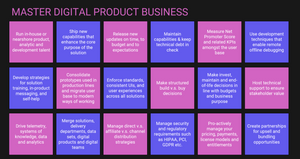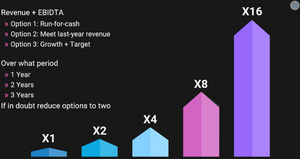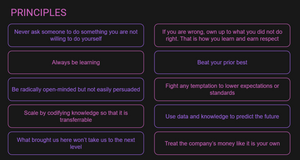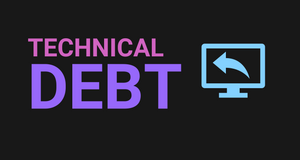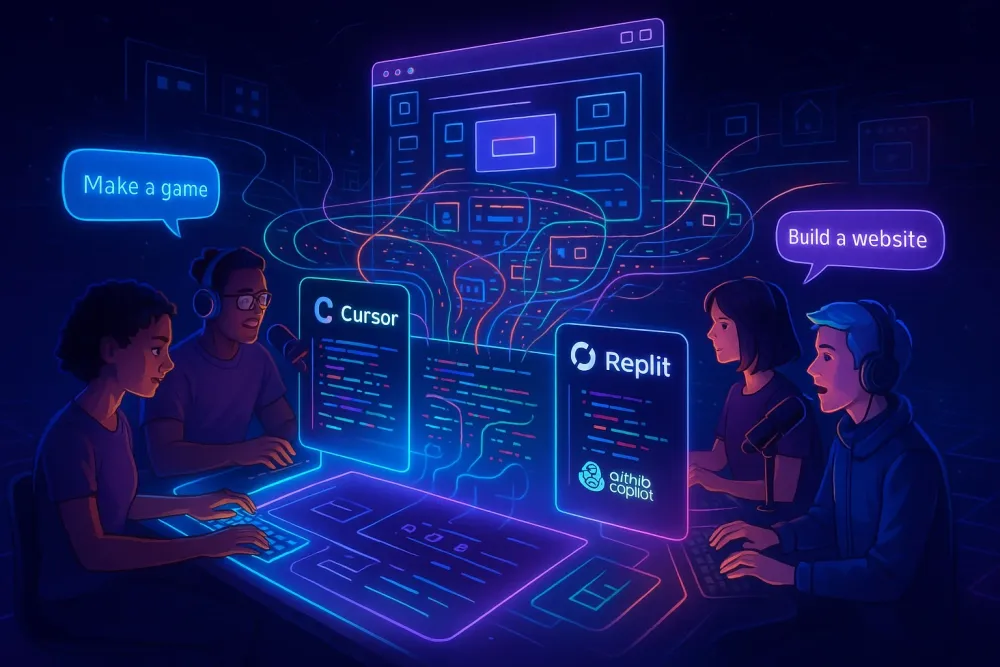Product teams create value by identifying the right problems, not by writing code. AI makes building easier but choosing what to build remains irreducibly human."
There's a panic spreading through Product Management circles:
"If I don't learn to code, I'm done."
Vibe coding transforms who can build software
Vibe coding uses natural language to generate software through AI, effectively democratizing coding to the point where 25% of Y Combinator's Winter 2025 startups run on 95% AI-generated code (missing context of what happens when that code hits production). Companies like Meta and Microsoft are restructuring for the fourth time in six months (albeit unclear whether a result of profitability exercises) while citing the net positive impact of AI on their code production (e.g., Satya Nadella indicating 30%+ of Microsoft code is written by AI).

Andrej Karpathy popularized Vibe Coding, describing it as "fully giving in to the vibes, embracing exponentials, and forgetting that the code even exists." This approach enables developers and non-developers alike to describe problems in natural language while AI generates the actual code.
Product managers at companies like Arize AI and Pendo report using AI solutions (eg, Lovable.dev, Replit, Bolt.new, and Cursor) to build working prototypes where they can start exploring a functional version of an idea before the idea itself is even fully baked. Product teams can prompt their AI solution of choice to also act in the role of a PM, asking them a series of meaningful questions to refine and clarify the product vision.
The best way of imagining an individual contributor in a team of "vibe PMs" (spanning Product Managers, Product Designers, and Product Content Specialists) act as "head chefs" in a kitchen, focusing on adding the critical human touch to a achieve a specific culinary experience. At the same time, AI tools serve as the "kitchen staff".
Confidence is both an opportunity and a danger. Depending on how "all-in" one embraces this "vibe", it has the potential to alter team dynamics fundamentally. It is here where individual and team maturity, coupled with pragmatic wisdom from past software development experiences, built on serving customer needs, need to come into play.
It is here where the barrier between product conception and implementation becomes a "gray area" where AI enables rapid experimentation and validation cycles that compress from weeks to hours. This "speed of iterating" and testing ideas/outputs "built on code" carries the danger of one's opinion overextending into the world of "ready for production" while not being fit-for-purpose (beyond giving early access to customers for feedback). We need to remain conscious that the "Need to ship" is also happening in a new modern world where new rules, and customer expectations on stable, consistent customer experiences, ongoing availability, privacy, and security come into play every day, across all industries, beyond one's ability to ship "capabilities".
And here lies the sensitivity. Assumptions and bold statements are made daily, around how AI-produced code is blindly deemed "production quality" because we can publish it and access it externally, without being thoroughly battle-tested for scale, change, new demands, maintenance, and ongoing pains that come in the natural course of driving and sustaining a mature software business.
Technical empathy meets AI accessibility.

Product School's 2025 research reveals compelling arguments for non-technical roles to embrace coding. The primary benefit isn't becoming a full-stack developer but gaining what practitioners call "technical empathy". This means the ability to understand engineering constraints, communicate effectively with development teams, and make informed challenges or product decisions.
Steven Sinofsky (former Windows president at Microsoft) long argued for technical depth in product:
"so when the engineer tells a product manager, 'That's not possible,' a PM can say, 'Of course it is, and here's how.'"
The practical advantages extend beyond communication. PMs with coding appreciation typically report being trusted more by engineering counterparts, as there is an understanding of what is needed to get the job done.
But is the value in the "coding" exercise or in the ability to effectively engineer a context that an engineer or AI can take in to flesh out a prototype of the idea to work on? OpenAI and Anthropic CPOs both state that AI evaluations will be "the most important skill for PMs" rather than traditional coding proficiency.
Strategic thinking trumps syntax in the opportunity cost debate
The counterargument is built on fundamental resource allocation logic: every hour spent learning to code is an hour not invested in developing core PM competencies built on fundamental closeness to the customer and business needs/context. As Martin Boss puts it:
"We all have limited time and attention capacity... The fact that you've spent time learning how to code means you haven't spent it on something else that might be more important to you as a PM, such as honing your management or strategic thinking skills.".

While Vibe Coding capabilities are embraced, the Product teams must remember to keep their focus on market understanding, product vision, and crystal-clear requirement communication rather than implementation details. This means being even better at "defining problems and understanding that side of things... not to sit there and write out some JavaScript."
ProdPad research also shows collaboration, multitasking, and empathy are "way more fundamental than being able to write a line of code," with these soft skills becoming increasingly valuable as AI handles routine technical tasks.
The Risk of Role Blurring
Technical skills can make Product teams err to impose expertise in areas where others are typically more "tuned in" to make those types of decisions, leading to arguments about technology implementation instead of investing time in problem definition and clarity. Having strong views is essential, but knowing when to let a decision be made elsewhere is a critical Product skill. Focusing on technical decisions tends to cause Product Team members to miss broader business and user needs while prioritizing technical elegance over strategic outcomes. Product Teams need to continue focusing on their strengths, leveraging AI to refine and improve their ability to strategically think, problem-solve, and develop user advocacy. These skills do not require any specific coding prowess and are fully customer-centric activities to be done.
AI emphasizes the need for more domain knowledge and radical "Focus on outcomes"

Our Industry is constructively discussing how AI will reshape product management:
Lenny Rachitsky (of lennysnewsletter) poses that AI will take more aspects of the work needed to build a cohesive strategy and vision. At the same time, Product teams will focus more on communication and influence. This suggests human relationship skills (to identify blockers, conduct, orchestrate, and be the glue across teams) become more valuable as AI handles analytical work.
"AI will have the most profound impact on the high-level skills of product management: developing a strategy, crafting a vision, identifying new opportunities... Soft skills like product sense, communication, creativity will become even more important."
Julie Zhuo, former Facebook VP of Design, predicts the traditional Engineer-Product-Designer TRIO-led teams will give way to tiny 1-3 person teams, with blurred functional roles, working across the stack and experience to solve a dedicated problem. While this suggests the emergence of "Product Engineers" and "Design Engineers", there is also substantial evidence of crashes against cultural barriers, difficulty in assessing real competencies, and challenges in isolating individual contributions in cross-functional work. Spotify's/ING Bank failed squad model also supports this and needs to be taken as a cautionary tale. Both returned to traditional management structures after encountering matrix management failures, a lack of accountability, excessive autonomy without alignment, and insufficient collaboration frameworks in the squad model. The role of Design Engineer is also identified as "contentious" by industry observers, which provides "young tech creatives a clear career path beyond having to specialize," but faces resistance from traditional role hierarchies.
Marty Cagan offers a more measured perspective, noting that "two years in, we're all still figuring things out" while predicting virtually all PMs will need to become "AI product managers." Silicon Valley Product Group, warns that while AI tools speed processes, "that doesn't necessarily translate into faster and better outcomes," emphasizing the continued importance of product discovery and human judgment.
Interestingly, even Sinovsky adds a crucial nuance:
""PM works best when it acts less like the boss and more like the glue that binds the team together. PM works best when the goals are developed by listening and synthesizing rather than talking and commanding."
and...
"PM works best when making sure that the best ideas no matter where they come from rise to the top."
"If what the product manager takes care of is a more technical product, it is very important that the product manager has a technical background. But for products aimed at accountants, human resources, or security and privacy practitioners? The more she knows about <domain X>, the better."
Investor Value

From an investor perspective, the math and business value creation chain is straightforward:
- Product teams are there to identify high-return opportunities that create exponentially more value than those who build prototypes.
- The business value creation chain remains unchanged by AI. Product teams spot opportunities, engineering captures that value, and AI simply accelerates the building phase.
When every competitor can generate code through AI, competitive differentiation doesn't come from technical implementation but from choosing which problems to solve and understanding why customers will pay for those solutions.
This means the future of Product Team value will be fully captured in their ability to deliver business outcomes (revenue growth, customer retention, market expansion) not on their ability to build or debug code.
The capital-efficient approach isn't in training every Product Team member to code. It's about ensuring Product Team members excel at opportunity identification while leveraging AI tools as force multipliers. In a world where code becomes commoditized through AI, the scarcest and most valuable resource is the ability to identify which problems are worth solving. Investors backing companies that confuse technical activity with value creation will find themselves funding expensive engineering teams building elegant solutions to problems nobody will pay to solve.
Companies restructure while new frameworks emerge
While new product operating frameworks will emerge to navigate this complexity, product teams must continue shaping their focus on opportunity spotting, while optimizing for sustainable growth through data moats and 'data network effects' where every customer and user interaction improves AI for all users.
I particularly respond to a16z's 5 Principles for AI Product Management that introduce radical approaches like "Interview Your Models Like Customers" to understand probabilistic outputs and "Reflexive AI use is tipping from differentiator to default". The framework advocates building "Emotional Moats" by leveraging areas traditional tech avoids, i.e., disagreement and persuasion, while emphasizing the need to "Become AI-Native" through daily usage of AI tools across all job functions, whilst recognizing your customers are doing the same!
Conclusion

The debate over coding for non-technical roles reflects a deeper transformation in how products get built and who participates in that process. Vibe coding has made technical implementation more accessible......blurring the line of ownership......and dangerously distracting Product Teams from core purpose, namely:
- Customer-success-obsession that advances outcomes & value realisation
- Business Context & Stakeholder Priorities
- Problem definition
- Opportunity framing
- Constraints understanding
- Facilitating speedy ideation & validation
- Seeing gaps others miss and framing problems worth solving
- Blocker removal.
- Being the glue that binds the team together
...and...staying radically and uniquely human:

- Understanding customer and partner anxiety
- Navigating organizational politics
- Building team psychological safety
- Making ethical trade-offs
- Synthesizing non-obvious connections
As senior developers told Salesforce Ben: "AI can help you be a more productive developer... but you still need that person... to make judgment calls."
The winners in this new landscape won't be those who choose definitively between technical and strategic skills, but those who understand how AI changes the value equation for both.
The evidence suggests Product Managers, Product Designers, and Product Content Specialists must develop enough technical literacy to collaborate with AI tools AND engineering teams, effectively, but not at the expense of their core strategic competencies.
As Airfocus correctly articulates it: the future belongs to "T-shaped" professionals who combine deep expertise in human-centered skills like empathy, vision, and systems thinking with broad technical fluency that enables them to leverage AI as a force multiplier, where your ability to orchestrate and work with your peers and AI-Agents to provide superior context and strategic judgment that creates a cohesive vision, and human connection.
Join the Debate
Where do you stand?
What customer outcome have you enabled that had nothing to do with your coding ability? What technical constraint have you navigated that required deep understanding but zero coding?

